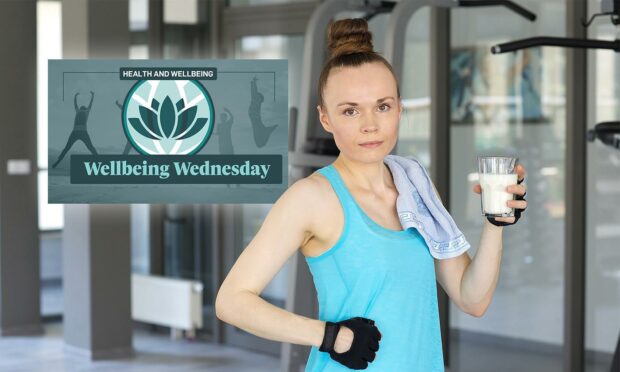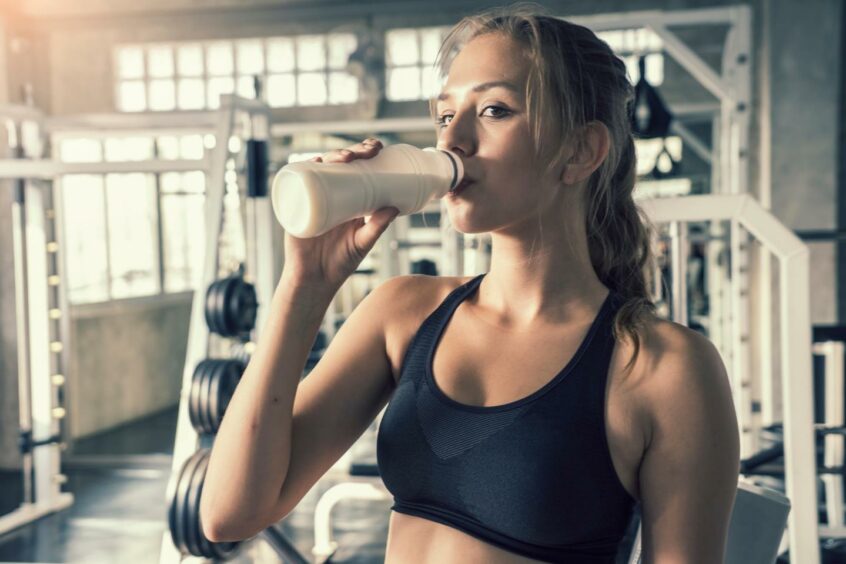Find yourself reaching for protein shakes to improve your performance and recovery after a workout?
But what if you found out all you really need is a simple glass of milk?
As part of our Wellbeing Wednesday series Aberdeen dietitian Marie McKimmie tells us how much protein we should all eat.
And she tells us why milk is the perfect post-exercise snack to help us repair our bodies.
What is protein and how much should we eat?
Protein is a macronutrient and plays an important role in the body. It is essential for the body to grow and repair.
It builds tissue, is responsible for making hormones, enzymes, blood cells and also helps repair our muscles.
But we don’t actually need a huge amount of it on our plates to meet our daily requirement of 0.75g per kilogram of body weight.
A woman weighing 70kg will need around 53g of protein each day and Marie highlights that this is not really hard for most people to achieve.
“A lot of people think we need to get a lot of protein in our diet but actually in the UK population we probably eat about double what we need,” she said.
Although she does point out that our recommended intake can vary on our age and activity levels.
If we’re doing an hour of exercise a day we’ll need more – up to 1.2 grams of protein per kilogram of body weight, rising to 1.7 grams for endurance athletes.
Do high protein foods speed recovery after exercise?
Yes they do. The ideal recovery snack contains a mix of carbohydrates and protein to help replenish your energy and repair your muscles.
It’s recommended that you drink or eat that snack within two hours after your workout because that’s when your body will boost glycogen storage and promote muscle repair.
“Milk is an excellent source of carbohydrate and protein – it’s one of the best things that you can consume after exercising,” Marie said.
“Generally, I would say have something like that probably half an hour to a couple of hours after your exercise session if you’re planning to exercise again within a 24-hour period.
“That window of time helps because the carbohydrates and protein very much work together in, for example, replacing that glycogen you have lost during your training session.”
Other snacks you can have include yoghurt, a hot chocolate drink, peanut butter on toast or eggs.
Can protein help with weight loss?
Evidence shows that diets higher in protein and slightly lower in carbohydrates can help with weight loss and weight maintenance.
Eating protein is good for satiety, leaving us feeling fuller for longer and helping to suppress our appetites.
Making sure we’re dishing up enough of it on our plates also helps support a healthy metabolism.
What foods contain protein?
Protein can be found in both animal and plant-based products.
Recommendations are to consume a variety of foods to ensure intake of various amino acids that are the building blocks of protein.
You can find protein in red meat such as lean beef mince, chicken, turkey, beans, peas and lentils.
Marie advises that people following a vegan diet should pay more attention to the protein content of foods.
“If we look at a burger made from beans, it will contain much more protein compared to a burger made from jackfruit,” she said.
“The same applies to many vegan cheeses which contain virtually no protein at all.”
Do we actually need protein powders?
“There actually isn’t really a need for protein powders,” Marie says. “If we’re eating healthily then generally we can get all the protein that we need through our normal diet.
“Yes, it can be convenient at times, if we’ve got busy lifestyles and if we’re struggling to accommodate meals around our gym workouts then they can help.
“But I would not substitute normal healthy foods for protein powders.”



